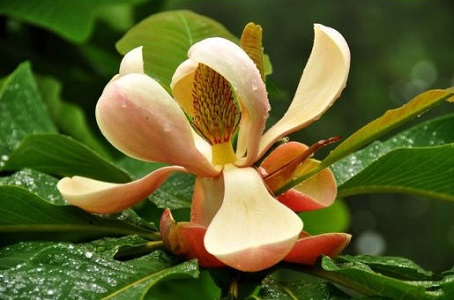Herbs And Phytochemicals: Magnolia Flower Extract - A Natural Shield Against Ovarian Damage
Nikhil Prasad Fact checked by:Thailand Medical News Team Jun 13, 2024 10 months, 1 week, 6 days, 9 hours, 5 minutes ago
Herbs And Phytochemicals: In traditional medicine, Magnoliae Flos, the flower buds of Magnolia trees, has been cherished for its ability to alleviate sinus issues, headaches, and more. But recent scientific studies suggest this humble flower might hold the key to protecting women’s reproductive health, particularly against premature ovarian insufficiency (POI).
 Magnolia Flower Extract - A Natural Shield Against Ovarian Damage
The Rising Concern of Premature Ovarian Insufficiency
Magnolia Flower Extract - A Natural Shield Against Ovarian Damage
The Rising Concern of Premature Ovarian Insufficiency
With more women choosing to delay marriage and childbirth, there’s been a noticeable rise in infertility issues. One significant factor is POI, which occurs when the ovaries stop functioning before the age of 40. Unlike menopause, which is a natural part of aging, POI can be sudden and is often triggered by external factors like chemotherapy, radiation, autoimmune diseases, or surgical removal of the ovaries.
In South Korea, the number of young women diagnosed with POI has dramatically increased, underscoring the urgent need for effective treatments. Symptoms of POI include irregular periods, hot flashes, insomnia, and even emotional disturbances like depression and anxiety. Moreover, it heightens the risks of osteoporosis, cardiovascular diseases, and infertility.
Conventional Treatments and Their Drawbacks
Currently, hormone replacement therapy (HRT) is the go-to treatment for POI. While HRT can alleviate many symptoms associated with menopause, it doesn't restore ovarian function and carries its own risks, including cardiovascular diseases and certain cancers. This has led many to seek alternative therapies, especially those rooted in traditional medicine.
Magnoliae Flos: A Promising Alternative
Magnoliae Flos (MF), known as Shinyi in Korean, is traditionally used to treat various ailments, including sinusitis and headaches. Recent
Herbs And Phytochemicals studies have revealed its potent anti-inflammatory, antibacterial, antioxidant, and even neuroprotective properties. But can it help with POI?
A research team from Dongguk University and Honam University in Korea decided to investigate. They focused on how MF extract (MFE) could protect ovarian cells from damage caused by 4-vinylcyclohexene diepoxide (VCD), a chemical known to induce POI by targeting ovarian follicles.
The Study: A Deep Dive into Magnolia's Benefits
The researchers conducted both in vitro (cell-based) and in vivo (animal-based) studies. They treated ovarian cells and mice with VCD to simulate POI conditions and then introduced MFE to see if it could prevent the damage.
In Vitro Findings
In the lab, VCD exposure significantly reduced the viability of ovarian cells and increased the production of reactive oxygen species (ROS), which are harmful molecules that can lead to cell death. However, pretreating the cells with MFE effectively countered these effects. The cells showed
reduced ROS levels and less cell death, suggesting that MFE has protective properties.
In Vivo Findings
In the animal studies, female mice treated with VCD showed significant ovarian damage, including reduced ovary size and lower levels of crucial hormones like estradiol and anti-Müllerian hormone (AMH). These changes mimic the effects seen in women with POI. Remarkably, mice that received MFE alongside VCD showed much healthier ovaries, with better hormone levels and more ovarian follicles, indicating that MFE could mitigate the damaging effects of VCD.
How Does It Work?
The protective effects of MFE appear to be linked to the activation of the Akt signaling pathway, a critical pathway that helps cells survive and resist damage. By boosting this pathway, MFE helps ovarian cells fend off the harmful effects of VCD.
Why It Matters
This study provides a promising outlook for women struggling with or at risk of POI. If further research confirms these findings, MFE could become a natural, safer alternative to current treatments, offering hope to many women facing infertility and other health issues related to POI.
Looking Ahead
While these initial results are promising, more research is needed to fully understand MFE's potential and how it can be best used in clinical settings. The safety profile of MFE is encouraging, with no significant side effects observed in the study, but larger-scale studies and clinical trials will be crucial to ensure its efficacy and safety for human use.
In summary, Magnoliae Flos extract shows great promise as a protective agent against ovarian damage and a potential natural treatment for premature ovarian insufficiency. This could mark a significant step forward in women's reproductive health, offering a new tool in the fight against infertility and the health challenges posed by POI.
The study findings were published in the peer reviewed International Journal of Molecular Sciences.
https://www.mdpi.com/1422-0067/25/12/6456
For the latest on
Herbs And Phytochemicals, keep on logging to Thailand Medical News.
Read Also:
https://www.thailandmedical.news/news/bad-gut-microbiome-linked-to-polycystic-ovary-syndrome--and-obesity-in-teenagers
https://www.thailandmedical.news/news/polycystic-ovary-syndrome-study-shows-younger-females-with-polycystic-ovary-syndrome-have-increased-risk-of-heart-conditions
